My.Family - Ancestors, Descendants and Others
Person Page 7
Leon Marcel Bouvier 1
1
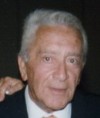
1923-2005
1996 photo
Parents
- Father: Adolf Aschkenazy (b. 2 September 1886, d. 1942)
- Mother: Regina Brüll (b. 2 November 1882, d. 14 July 1939)
Biography
- Leon Marcel Bouvier was born on 29 September 1923 in Vienna, Austria.
- In 1936 his parents decided it was time for him to leave Austria so they sent him to a boarding school in Paris.1
- His original name was Leo Aschkenazy, but after he had fought for France and adopted it as his homeland he changed his name to Leon Marcel Bouvier.2
- In 1940 he joined the Free French Forces under the command of General Koenig and went to British North Africa to fight the Germans. During a brutal battle he displayed exceeding bravery and was severly wounded.2
- It was during the Bir Hakeim battle in Lybia in June of 1942, while transporting munitions by night he was bombed by the Germans and lost his right arm and 2 fingers of his left hand. He recuperated in Beirut, Lebanon.1,2
- For his heroic act he was made 'Compagnon de la Liberation' by General de Gaulle in 1942. He was also awarded the 'Grand Croix of the Legion of Honor' which is the highest French medal.2
- He attended school at McGill University, Canada, to study foreign diplomacy.1,2
- He became a highly prominent French diplomat - eventually serving as ambassador to Paragyay, Chile and Denmark.2
- Leon married Christiane Rigal on 11 December 1950 in Paris, France.2
- He died on 23 July 2005 in Paris, France, at age 81.3
Family: Christiane Rigal (b. 15 March 1930, d. 31 August 2009)
- Eric Roger Adolf Bouvier (b. 10 December 1953, d. 11 August 2018)
- Benjamin Kurt Bernard Daniel Bouvier+ (b. 7 May 1959, d. 11 January 2011)
- Lorraine Regina Elizabeth Bouvier
- David Lione Philippe Bouvier+
Other Information
- Relationship: Uncle of William Reinfeld
- Charts/Lists: LOP Second World War, Reinfeld Family
- Last Edited: 19 September 2024 16:46:29
Citations
Edith Ann Reinfeld 1
1

1909-1982
1918 photo
Parents
- Father: Wilhelm Reinfeld (b. April 1879, d. May 1919)
- Mother: Regina Brüll (b. 2 November 1882, d. 14 July 1939)
Biography
- Edith Ann Reinfeld was born on 5 March 1909 in Vienna, Austria.2
- Edith married Fritz Deutsch in 1936 in Vienna, Austria.2
- Her husband Fritz Deutsch died leaving her a widow at age ~33.2
- About 1938 when the war began she went to England on a domestic visa as a cook.2
- Edith married William Roy Sanders about 1939.2
- She migrated to Melbourne, Australia, in 1952 together with William Roy Sanders.2,1
- She died in 1982 in Melbourne, Australia, at age ~73.2,1
Family: Fritz Deutsch (b. estimated 1905, d. August 1938)
Family: William Roy Sanders (b. 31 December 1912, d. 4 July 1976)
- Nicholas Sanders+
- Michael Adrian Sanders+ (b. 26 May 1953, d. October 1979)
Other Information
- Relationship: Aunt of William Reinfeld
- Charts/Lists: Reinfeld Family
- Last Edited: 19 September 2024 16:46:29
Citations
Leo Brüll 1
1
Biography
- Leo Brüll was born estimated 1843 in Jaroslaw, Poland.2,3,4
- Leo married Helene Stieber, daughter of Herr --- Stieber, estimated 1869 in Jaroslaw, Poland.1,3
- (early 1870s) Leo and Helene moved to Vienna, Austria.1
- They lived with their daughter Regina in Vienna.1
- Leo was very religious in his old age, and went to the temple every day.1
- He died in 1927 in Vienna, Austria, at age ~84 or possibly in 1923.1,3
Family: Helene Stieber (b. estimated 1851, d. 1927)
- Antonia Brüll+ (b. about 1872, d. between 1940 and 1942)
- Bernhard Brüll+ (b. about 1876, d. 19 March 1934)
- Wilhelm Brüll+ (b. about 1880, d. between 1940 and 1942)
- Regina Brüll+ (b. 2 November 1882, d. 14 July 1939)
- Norbert Johann Brüll+ (b. 9 June 1885, d. 11 October 1938)
Other Information
- Relationship: Great-grandfather of William Reinfeld
- Charts/Lists: Ancestors of William Reinfeld, Reinfeld Family
- Last Edited: 3 January 2026 11:57:15
Citations
Bernhard Brüll 1
1
Parents
- Father: Leo Brüll (b. estimated 1843, d. 1927)
- Mother: Helene Stieber (b. estimated 1851, d. 1927)
Biography
- Bernhard Brüll was born about 1876 in Jaroslaw, Poland.2,1,3
- Bernhard married Bertha Engel estimated 1900 in Vienna, Austria.3,4
- He died on 19 March 1934 in Vienna, Austria, at age ~58.5,2
- He was buried in Wiener Zentralfriedhof, Vienna, Austria. .2
Plot: Section: T4 Group: 016 A Row: 4 Grave: 37
Address: 1020, Taborstr: 36. Cemetery Address XI. Simmeringer Hauptstrasse 244. This is the New Jewish cemetery in Vienna with graves from 1918-present.
 JOWBR_Brull_Bernhard
JOWBR_Brull_Bernhard
Family: Bertha Engel (b. 30 May 1876, d. 1942)
- Gabriel Brüll+ (b. 10 April 1902, d. 12 February 1963)
- Rose Brüll+ (b. 13 December 1903, d. 20 July 1957)
- Egon Brüll (b. about 1907, d. 1942)
- Mella Brüll (b. 18 December 1912)
Other Information
- Relationship: Granduncle of William Reinfeld
- Charts/Lists: Reinfeld Family
- Last Edited: 12 November 2025 15:14:51
Citations
Norbert Johann Brüll 1,2
1,2
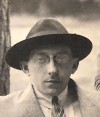
1885-1938
Parents
- Father: Leo Brüll (b. estimated 1843, d. 1927)
- Mother: Helene Stieber (b. estimated 1851, d. 1927)
Biography
- Norbert Johann Brüll was born on 9 June 1885 in Jaroslaw, Poland.3
- Norbert married Ernestine Lili Gruener, daughter of Marcus Gruener and Ida Gabel, on 4 August 1911 in Vienna, Austria.3
- Norbert Johann Brüll and Ernestine appeared in a family photo about 1920.4
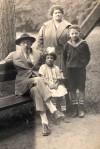 Norbert Brull and Ernestine Gruener Brull
Norbert Brull and Ernestine Gruener Brull
Bertold and Hilde
photo probably c 1920 - Norbert and Ernestine lived at 4/11 Wallensteinplatt, Vienna, Austria, as listed on the document when her son Bertold arrived in America.5
- He died on 11 October 1938 in Berlin, Germany, at age 53.6,3
- He was buried in Berlin, Germany.3
Family: Ernestine Lili Gruener (b. 16 February 1890, d. 2 September 1972)
- Bertold Bruell+ (b. 20 May 1912, d. 19 March 1995)
- Hilde Bruell (b. 4 July 1916, d. 21 November 2022)
Other Information
- Relationship: Granduncle of William Reinfeld
- Charts/Lists: Reinfeld Family
- Last Edited: 19 September 2024 16:46:29
Citations
Antonia Brüll 1
1
Parents
- Father: Leo Brüll (b. estimated 1843, d. 1927)
- Mother: Helene Stieber (b. estimated 1851, d. 1927)
Biography
- Antonia Brüll was born about 1872 in Jaroslaw, Poland.1,2
- Antonia married Heinrich Arzt estimated 1892.3
- Antonia, her son and wife, her grandson and her daughter all were sent to a concentration camp.4
- She died between 1940 and 1942 in the concentration camp.4
Family: Heinrich Arzt (b. 8 February 1873, d. 16 August 1943)
- Emil Arzt (b. estimated 1894, d. 1975)
- Edward Arzt (b. 1900, d. 1985)
- Maximillian Arzt (b. 9 January 1900, d. 15 June 1942)
- Melanie Arzt (b. 10 January 1903, d. June 1976)
- Stella Arzt (b. 4 August 1911, d. 15 June 1942)
Other Information
- Relationship: Grandaunt of William Reinfeld
- Charts/Lists: Reinfeld Family
- Last Edited: 19 September 2024 16:46:29
Citations
Leah Tilney 1
1
- Sargent Lineage: Timothy11, Bradford10, Rhoda Miles Sargent9, Henry8, Joseph7, Joseph6, Joseph5, Joseph4, Joseph3, Joseph2, John1, William0
Parents
- Father: Timothy Collins Tilney
- Mother: Susan Wood (b. about 1946, d. before 2025)
Other Information
-
Relationship:
3rd cousin 1 time removed of Linda Sargent
12th cousin 1 time removed of Kyle Lawrence Mueller
10th cousin 2 times removed of Julianne Stoughton - Charts/Lists: Descendant Chart for Griffith Bowen, Descendant Chart for Thomas Trowbridge, Descendants of JBS, Descendants of JBS (with spouses), Descendants of William Sargent, Immigrant, Sargent Family of New Haven
- Last Edited: 27 October 2025 12:45:10
Citations
Ernestine Lili Gruener 1
1
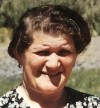
1890-1972
Parents
- Father: Marcus Gruener (b. 1863, d. 1923)
- Mother: Ida Gabel (b. estimated 1870, d. 16 February 1890)
Biography
- Ernestine Lili Gruener was born on 16 February 1890 in Jaroslaw, Poland.2
- Ernestine married Norbert Johann Brüll, son of Leo Brüll and Helene Stieber, on 4 August 1911 in Vienna, Austria.2
- Norbert Johann Brüll and Ernestine appeared in a family photo about 1920.3
 Norbert Brull and Ernestine Gruener Brull
Norbert Brull and Ernestine Gruener Brull
Bertold and Hilde
photo probably c 1920 - Norbert and Ernestine lived at 4/11 Wallensteinplatt, Vienna, Austria, as listed on the document when her son Bertold arrived in America.4
- Her husband Norbert Johann Brüll died leaving her a widow at age 53.5,23
 Ernestine and her daughter Hilde
Ernestine and her daughter Hilde
probably in England say 1939- She immigrated to New York City, New York, on 21 September 1940 sailing from Liverpool, England on the ship S.S. Scythia. On the official entry documents she indicated she could read and write English and German, and listed household duties as her calling. She was coming to join her son B Bruel in Brooklyn, NY, arriving with $50.4
- She died on 2 September 1972 in Seattle, Washington, at age 82.1
- She was buried in Washington Memorial Park, SeaTac, Washington. Plot: Garden of Light Sec 20M Lot 67 Grave C1.6
 Gravestone
Gravestone
Family: Norbert Johann Brüll (b. 9 June 1885, d. 11 October 1938)
- Bertold Bruell+ (b. 20 May 1912, d. 19 March 1995)
- Hilde Bruell (b. 4 July 1916, d. 21 November 2022)
Other Information
- Charts/Lists: Reinfeld Family
- Last Edited: 19 September 2024 16:46:29
Citations
Hilde Bruell
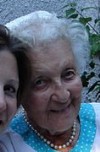
2006 photo
Parents
- Father: Norbert Johann Brüll (b. 9 June 1885, d. 11 October 1938)
- Mother: Ernestine Lili Gruener (b. 16 February 1890, d. 2 September 1972)
Biography
- Hilde Bruell was born on 4 July 1916 in Vienna, Austria.1
- She appeared in a family photo that was taken about 1920.2
 Norbert Brull and Ernestine Gruener Brull
Norbert Brull and Ernestine Gruener Brull
Bertold and Hilde
photo probably c 1920 - Hilde studied ballet in Vienna.22
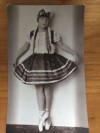 Hilde as a ballet student
Hilde as a ballet student  Ernestine and her daughter Hilde
Ernestine and her daughter Hilde
probably in England say 1939- She immigrated on 25 June 1940 on the ship S.S. Scythia from Liverpool, England. Her mother sailed on the same ship three months later. On the immigration form she was identified as a dancer, and able to read and write in German and English. She arrived with $10, and came to stay with her brother in Brooklyn.3
- She married, but had no children. She and her husband were divorced.42
 Hilde in America
Hilde in America- Hilde owned a ballet school in San Francisco. She also owned and managed some buildings in Oakland, CA and car washes.5,6
- Hilde lived in Oakland, California.7
- On 4 July 2022 Hilde had a party at the assisted living place when she was 106. I know Heidi and Lisa visited her on that occasion.2
 Hilde Bruell 106th birthday
Hilde Bruell 106th birthday
1916-2022 - She died on 21 November 2022 in Oakland, California, at age 106.8
Obituary Notice
Obituary
Hilde Bruell, an Austrian Jew who witnessed and escaped the horrors of Nazi Germany, danced as a ballerina across European opera houses, and built her own home and businesses in Oakland, California, died November 21, 2022 at the age of 106.
Hilde was born July 4, 1916 in Vienna to parents Lili and Norbert. Hilde lived a childhood of privilege and high expectations in Austria, “practicing ballet until her feet were bloody.” That life came to an end when the Nazis took power. Like many Jewish families, they lost everything and were forced to flee to survive.
Hilde first went to London where she and her mother worked as domestics. Her brother, Bertold, had immigrated before her and with the help of architect James Fitch, the “21” Club, and Quakers, Hilde and her mother were able to come to New York. In New York, she became active as a union leader while working in a garment factory. A highlight for Hilde was meeting and dining with Golda Meir who had come to New York to lend support to the garment workers.
She eventually found her home in Oakland, California, where she met her long-time companion David Fyne. As business partners, the two built more than a dozen car washes, operated an accident reporting business, opened and operated several ballet schools in the East Bay and Silicon Valley—and built the apartment building on Lake Merritt that Hilde lived in for over 50 years.
Until her mid-90s, Hilde traveled to Vienna twice a year to reconnect with her heritage. And at a century old, Hilde did 100 pliés a day, walked Lake Merritt daily dressed to the nines, and made lifelong friends in the apartment building she owned. Thanks to Kathy, Amy, Teddy, Maia, and Marisha, she was able to stay in the apartment she loved. The Mastick Senior Center in Alameda was another source of friendship. Dave, Vicki, Millie, Jossie, Anna, and Ingrid became beloved friends. Rudi, Fumio, Joachim visited and called often, regularly sending sweets and updates on friends in the United States and Europe.
In her final years, Hilde grew very close with her niece Stephany and Stephany’s husband Beau Sadick. The two visited Hilde frequently, helping her manage her affairs, planning her birthday parties, and providing companionship as she prepared for the end of her life. Above all, Hilde loved and valued her family—and held high expectations of them.
Hilde took pride in the sharpness of her mind and her own independence. She lived on her own until the age of 103, after which she entered the Pacifica Senior Living, under the care of Suncrest Hospice. She respected and adored her caregivers; they returned the love and adoration.
Memories of Nazism and grief for her many family and friends who died in the holocaust continued to haunt Hilde, but she found fulfillment in sharing those stories and imploring younger generations to stay vigilant against the evils of racism, fascism, and bigotry of all kinds. Hilde was eternally grateful to the United States for taking her in when Nazis invaded her homeland.
Hilde experienced two global pandemics, danced for the king and queen of England, witnessed the best and worst of humanity, and took immense pride in the life and career she built in the country that became her home. After living an odyssey of a life, she passed away peacefully from natural causes.
Hilde will be buried between her mother Lili and her brother Bertold at the Washington Memorial Park.
Hilde is survived by her niece Stephany Bruell (Beau Sadick), and nephews Mark Bruell and David Bruell (Jan Bruell), grand-nephew Alex Bruell, and cousins Bill Reinfeld, Heidi Reinfeld, Lisa Mueller, and Daniella Camhy.2
More lessons from Hilde
Here’s a few things my great-aunt would have liked you to know.
By Alex Bruell • December 5, 2022 2:30 pm
My great-aunt Hilde Bruell, an Austrian Jew who escaped the horrors of Nazi Germany, danced as a prima ballerina across European opera houses, and built her own home and businesses in Oakland, California, died Nov. 21, 2022 at the age of 106. She passed peacefully in the excellent care of her senior living center and hospice caregivers in Oakland.
Hilde lived a childhood of privilege and high expectations in Austria, practicing ballet as a girl until her feet were bloody. That life came to an end when the Nazis took power. Like many Jewish families, Hilde and her family lost everything and were forced to flee to survive.
She went to London, then New York, then Oakland, where she built her home and several successful business ventures with her longtime companion David Fyne. Over her life, she took pride and joy in being a union leader, a ballet instructor and a citizen of the United States.
I first shared Hilde’s story with readers in a column published after her birthday in July. I implored readers to value their time with their elders, and now that Hilde’s gone, that lesson feels even truer.
She was, after all, part of a shrinking club: In only a few more decades, all the immediate survivors of the Holocaust will have passed away.
Many historians, journalists, researchers and museums will continue to document what happened to those people, and one day, their critical work will be all that remains of that era. But something important is lost when the people who were there – good and bad – have all died.
We can reconstruct their actions and motivations, but we can’t ask them clarifying questions. We can’t interrogate their mistruths. And we can apologize for not being better listeners, we can ask to hear stories that we tuned out the first time, but we will only hear silence in return.
Quite literally, it is like investigating a crime scene after the suspects, victims and witnesses have all left: All that remains is the blood on the wall, the fingerprints on the counter, and the bullet casings all over the floor, like ghosts of memories.
And even those ghosts – good God, they make me feel like crumpling at my desk.
There was, for example, the motorcyclist who gave 22-year-old Hilde an urgent ride one morning to the English consulate in Vienna, where Hilde would get the documentation she needed to leave Austria. Hilde told the motorcyclist honestly that she was secretly a Jew fleeing the country – even though she’d already seen the swastika on his armband.
“Hop in,” he responded, promising he would not reveal her secret, though they both knew he could be killed for harboring a Jew.
Eighty years later, she still remembered him. “He was my angel,” Hilde told me.
What do I make of this man who saved my Hilde, all while wearing the symbols of her oppression – was he perhaps a clandestine rebel against Hitler, or merely a footsoldier who felt a momentary tug of guilt or compassion? I would have loved to have interviewed him and found out.
Bur rather than dwell on what could have been, let’s talk about what Hilde wanted the world to know– the things that lit up her eyes and made her sit up in bed even when she was tired:
1. “Family is the most important thing.”
2. It’s OK to be nervous. When Hilde went on stage to perform an imitation of Charlie Chaplin for the King and Queen of England, she was nervous. But “if an artist is not nervous before her or his appearance, it’s no good. You’ve got to be nervous,” she said.
3. Be grateful for the chance to do something with your life. Take pride in your work and don’t be lazy. And make sure you’re paid well for that work.
4. Dance. Take a walk every day. Make friends who live near you.
5. Tell the truth.
6. When selecting a partner, find someone “warm, friendly, loving and caring.” Marry them and raise children, if you’re so inclined.
7. Do not become complacent in the fight against evil. The hatred that fueled Hitler’s forces of racism, fascism and bigotry could flame up again.
8. Dream of a day when our world treats people of all races and cultures equally. Then do your part to make that dream a little more real.
And here’s something I’d like you to know: Cherish your elderly family members, because if you’re lucky, you’ll be like them one day. Listen to and record their stories. Take lots of pictures. Help them lead healthy, busy lives — with plenty of knishes and chocolates snuck in, too.
I’ll conclude by quoting a couple of passages from “Ancestress,” a tribute by Icelandic musician Björk to her late mother Hildur. Released in late September as part of Björk’s album Fossora, the song has helped me process my own great-aunt’s death.
“My ancestress’ clock is ticking
Her once vibrant rebellion is fading
I am her hopekeeper
I assure hope is there
At all times”
…
“By now, we share the same flesh
As much as I tried to escape it
This is no mediocre debris
My ancestress”
To learn more about Hilde, visit alexbruell.com/2022/12/01/hilde/.9
Other Information
- Relationship: 1st cousin 1 time removed of William Reinfeld
- Charts/Lists: Reinfeld Family
- Last Edited: 19 September 2024 16:46:29
Citations
Bertold Bruell
 1
1
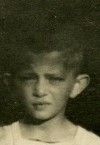
1918 photo
6 years old
Parents
- Father: Norbert Johann Brüll (b. 9 June 1885, d. 11 October 1938)
- Mother: Ernestine Lili Gruener (b. 16 February 1890, d. 2 September 1972)
Biography
- Bertold Bruell was born on 20 May 1912 in Vienna, Austria.2
- He appeared in a family photo that was taken about 1920.3
 Norbert Brull and Ernestine Gruener Brull
Norbert Brull and Ernestine Gruener Brull
Bertold and Hilde
photo probably c 1920 - Bertold received his BarMitzvah on 30 May 1925 in Vienna.2
- He immigrated on 10 August 1938 sailing on the ship S S Normandie from Le Havre, France.4
- On the official entry documents he was listed as a student, able to read and write German, English and French, and intended to permanently reside in the US. He was joining a friend, Maxwell N Weisman, living at 5716 11th Street in Brooklyn.4
- Bertold lived at 606 Brighton Beach Ave, Brooklyn, New York.5
- Bertold was a family physician. For a short period of time he was a psychiatrist in a mental hospital.1
- Bertold married Edith Chapman on 24 July 1950 in Lake Tahoe, Nevada.2
- He died on 19 March 1995 in Federal Way, Washington, at age 82.1,2
- He was buried in Washington Memorial Park, SeaTac, Washington. Plot: Garden of Light Sec 20M Lot 67 Grave B4.2,6
 Gravestone
Gravestone
Family: Edith Chapman (b. 13 April 1921, d. 27 April 2005)
Obituary Notice
Bertold Bruell, MD, was a dedicated and much respected Family Practice physician for over thirty years in Federal Way, Washington. He touched the lives of many, and will be remembered as a very caring person. Dr. Bruell was on staff at both St. Joseph Hospital and Auburn General Hospital throughout this time. He was instrumental in the founding of St. Francis Hospital, Federal Way.6
Other Information
- Relationship: 1st cousin 1 time removed of William Reinfeld
- Charts/Lists: Reinfeld Family
- Last Edited: 19 September 2024 16:46:29
Citations
Wilhelm Brüll 1
1
Parents
- Father: Leo Brüll (b. estimated 1843, d. 1927)
- Mother: Helene Stieber (b. estimated 1851, d. 1927)
Biography
- Wilhelm Brüll was born about 1880 in Jaroslaw, Poland, Dave Bruell identified Jaroslaw Poland as his place of birth. Kurt Reinfeld identified Vienna Austria as his place of birth.2,1
- Wilhelm married Maria (née unknown) Brüll estimated 1915.2,3
- He died between 1940 and 1942 in a concentration camp (This information from Hedy Reinfeld, who was married to the son of Willie's sister Regina). David Bruell (the grandson of Willie's brother Norbert) said Willie died in 1938 in Belgium.4,2
Family: Maria (née unknown) Brüll (b. estimated 1890, d. 1985)
- Leo Brüll
- Herta Brüll+ (b. estimated 1920, d. about 1996)
- Kurt Brüll
Other Information
- Relationship: Granduncle of William Reinfeld
- Charts/Lists: Reinfeld Family
- Last Edited: 19 September 2024 16:46:29
Citations
Heinrich Arzt 1
1
Biography
- Heinrich Arzt was born on 8 February 1873.2
- He was also known as Henoch.2
- Heinrich married Antonia Brüll, daughter of Leo Brüll and Helene Stieber, estimated 1892.3
- In 1915 After his sister-in-law Regina was so successful in her dress business he went to work for her.4
- (prior to 1942) Heinrich lived at Pichlergasse 4/9, Vienna 9, Austria. This was his wartime address.2
- On 15 July 1942 he was sent from Vienna to Theresienstadt in Czechoslovakia.4,5
- He died on 16 August 1943 in concentration camp at age 70.1,2
- Theresienstadt was started by the Germans in 1940 and turned into a Jewish ghetto. To the outside world it was presented as a model Jewish settlement, but in reality it was a concentration camp. More than 150,000 Jews were sent to Theresienstadt, from Czechoslovakia, Germany, Austria, the Netherlands and Denmakr. Although it was not an extermination camp, about 33,000 people died there because of the appalling conditions, arising out of extreme population density. Many people were sent to Auschwitz and other extermination camps. At the end of the war there were 17,247 survivors.15,000 children children lived in the camp's children's home - only 93 survived. Theresienstadt supplied the German war effort with a source of Jewish slave labor. Also, because it was intended to be seen as a priviledged place for Jews, there were many educated people there, musicians, artists, writers, scientists. There were at least four orchestras in the camp, stage performances were produced, the composer Viktor Ullmann wrote 20 pieces, including an opera.6
Family: Antonia Brüll (b. about 1872, d. between 1940 and 1942)
- Emil Arzt (b. estimated 1894, d. 1975)
- Edward Arzt (b. 1900, d. 1985)
- Maximillian Arzt (b. 9 January 1900, d. 15 June 1942)
- Melanie Arzt (b. 10 January 1903, d. June 1976)
- Stella Arzt (b. 4 August 1911, d. 15 June 1942)
Other Information
- Charts/Lists: Reinfeld Family
- Last Edited: 19 September 2024 16:46:29
Citations
Edward Arzt

Parents
- Father: Heinrich Arzt (b. 8 February 1873, d. 16 August 1943)
- Mother: Antonia Brüll (b. about 1872, d. between 1940 and 1942)
Biography
- Edward Arzt was born in 1900 in Vienna, Austria.1
- He died in 1985 in America at age ~85.1
- I found a refugee card for Edward Arzt, born 7-4-1915 in Vienna, emigrated 4-10-1946 with Dina and Sylwia Lande. His occupation was a driver. from ancestry.com - Munich, Vienna and Barcelona Jewish Displaces Persons and Refuge Cards 194301959 (JDC.)
Other Information
- Relationship: 1st cousin 1 time removed of William Reinfeld
- Charts/Lists: Reinfeld Family
- Last Edited: 19 September 2024 16:46:29
Citations
Maximillian Arzt 1
1
Parents
- Father: Heinrich Arzt (b. 8 February 1873, d. 16 August 1943)
- Mother: Antonia Brüll (b. about 1872, d. between 1940 and 1942)
Biography
- Maximillian Arzt was born on 9 January 1900 in Vienna, Austria.2
- He was usually called Max.1
- Maximillian married Chana (née unknown) Arzt about 1930.3
- (prior to 1942) Maximillian lived at Pichlergasse 4/9, Vienna 9, Austria. This was his wartime address.2
- On 14 June 1942Maximillian, his wife Chana and his sister Stella were all sent from Vienna to Sobibor oder Majdanek, a concentration camp in Wlodawa, Lublin, Poland. Also deported at the same time was Hans Georg Arzt (b 12 Jun 1887) living at the same address (possibly an uncle). (see appendix for more information.)4,5
- He died on 15 June 1942 in concentration camp at age 42.4
- Sobibor was an extermination camp set up in the Lublin region of Poland. In May of 1942 the camp began mass gassing operations. Trains entered the railway station and the Jews onboard were told they were in a transit camp, then were forced to undress and hand over their valuables. They were then led along the 100-metre-long (109 yards) Road to Heaven (Himmelstrasse), which led to the gas chambers, where they were killed using carbon monoxide released from the exhaust pipes of tanks. Between 200,000 and 250,000 people were killed there.6
Family: Chana (née unknown) Arzt (b. 10 September 1908, d. 15 June 1942)
Other Information
- Relationship: 1st cousin 1 time removed of William Reinfeld
- Charts/Lists: Reinfeld Family
- Last Edited: 19 September 2024 16:46:29
Citations
Emil Arzt
Parents
- Father: Heinrich Arzt (b. 8 February 1873, d. 16 August 1943)
- Mother: Antonia Brüll (b. about 1872, d. between 1940 and 1942)
Biography
- Emil Arzt was born estimated 1894.1
- Emil married Trude (née unknown) Arzt estimated 1935.1,2
- He immigrated to Huntington Station, New York, before 10 January 1940 together with Trude (née unknown) Arzt They came to America via Shanghai.3
- He died in 1975 in America at age ~81.4
Family: Trude (née unknown) Arzt (b. about 1900)
Other Information
- Relationship: 1st cousin 1 time removed of William Reinfeld
- Charts/Lists: Reinfeld Family
- Last Edited: 19 September 2024 16:46:29
Citations
Melanie Arzt
 1
1
Parents
- Father: Heinrich Arzt (b. 8 February 1873, d. 16 August 1943)
- Mother: Antonia Brüll (b. about 1872, d. between 1940 and 1942)
Biography
- Melanie Arzt was born on 10 January 1903 in Vienna, Austria.2
- She was usually called Mella.1
- Melanie married Mr Wagenberg estimated 1936 in Israel.3,4
- Melanie married in her later 40's. She went to Israel and married there and lived there until her husband died. They never had children. She then moved to New York (probably to be near either her brothers Edward or Emil.)3
- She immigrated to New York City, New York, on 20 December 1956 from Haifa, Israel, on the ship S. S. Israel. (The baggage for each passenger is listed, but not understandable - Melanie had 1 T, 3 HB and 1 Pkg.)5
- She died in June 1976 in New York, New York, at age 73.2
Family: Mr Wagenberg (b. estimated 1896)
Other Information
- Relationship: 1st cousin 1 time removed of William Reinfeld
- Charts/Lists: Reinfeld Family
- Last Edited: 19 September 2024 16:46:29
Citations
Stella Arzt
Parents
- Father: Heinrich Arzt (b. 8 February 1873, d. 16 August 1943)
- Mother: Antonia Brüll (b. about 1872, d. between 1940 and 1942)
Biography
- Stella Arzt was born on 4 August 1911 in Vienna, Austria.1,2
- (prior to 1942) Stella lived at Pichlergasse 4/9, Vienna 9, Austria. This was the wartime address.2
- On 14 June 1942 Maximillian, his wife Chana and his sister Stella were all sent from Vienna to Sobibor oder Majdanek, a concentration camp in Wlodawa, Lublin, Poland. Also deported at the same time was Hans Georg Arzt (b 12 Jun 1887) living at the same address (possibly an uncle). (see appendix for more information.)3,4
- She died on 15 June 1942 in concentration camp at age 30.3
Story
Other Information
- Relationship: 1st cousin 1 time removed of William Reinfeld
- Charts/Lists: Reinfeld Family, Story List of People
- Last Edited: 9 February 2025 10:58:49
Citations
Mr Wagenberg
Biography
- Mr Wagenberg was born estimated 1896.1
- Mr married Melanie Arzt, daughter of Heinrich Arzt and Antonia Brüll, estimated 1936 in Israel.2,3
- Mr Wagenberg died in Israel.2
Family: Melanie Arzt (b. 10 January 1903, d. June 1976)
Other Information
- Charts/Lists: Reinfeld Family
- Last Edited: 19 September 2024 16:46:29
Citations
Christiane Rigal
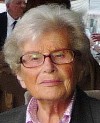
1930-2009
2009 photo
Biography
- Christiane Rigal was born on 15 March 1930 in Maisons Laffitte, France, a city near Paris.1,2
- Christiane married Leon Marcel Bouvier, son of Adolf Aschkenazy and Regina Brüll, on 11 December 1950 in Paris, France.3
- Christiane Rigal died on 31 August 2009 in Paris, France, at age 79.1
Family: Leon Marcel Bouvier (b. 29 September 1923, d. 23 July 2005)
- Eric Roger Adolf Bouvier (b. 10 December 1953, d. 11 August 2018)
- Benjamin Kurt Bernard Daniel Bouvier+ (b. 7 May 1959, d. 11 January 2011)
- Lorraine Regina Elizabeth Bouvier
- David Lione Philippe Bouvier+
Other Information
- Charts/Lists: Reinfeld Family
- Last Edited: 19 September 2024 16:46:29
Citations
Eric Roger Adolf Bouvier 1
1
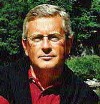
1953-2018
2010 photo
Parents
- Father: Leon Marcel Bouvier (b. 29 September 1923, d. 23 July 2005)
- Mother: Christiane Rigal (b. 15 March 1930, d. 31 August 2009)
Biography
- Eric Roger Adolf Bouvier was born on 10 December 1953 in Beirut, Lebanon.1
- Eric married Nathalie Mouton on 25 June 1982.2,3
- Eric and Nathalie were divorced a short while later.2
- He was employed by Indo-Suez bank, Paris, France, for twenty years. Following that he was a M & A manager for France Telecom. He is now retired.4,5,6
- He died on 11 August 2018 in Normandy, France, at age 64.7
Other Information
- Relationship: 1st cousin of William Reinfeld
- Charts/Lists: Reinfeld Family
- Last Edited: 19 September 2024 16:46:29
Citations
Benjamin Kurt Bernard Daniel Bouvier 1
1
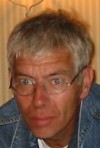
1959-2011
2006 photo
Parents
- Father: Leon Marcel Bouvier (b. 29 September 1923, d. 23 July 2005)
- Mother: Christiane Rigal (b. 15 March 1930, d. 31 August 2009)
Biography
- Benjamin Kurt Bernard Daniel Bouvier was born on 7 May 1959 in Neuilly, France.
- He died on 11 January 2011 in France at age 51.2
Other Information
- Relationship: 1st cousin of William Reinfeld
- Charts/Lists: Reinfeld Family
- Last Edited: 19 September 2024 16:46:29
Citations
Lorraine Regina Elizabeth Bouvier 1
1
Parents
- Father: Leon Marcel Bouvier (b. 29 September 1923, d. 23 July 2005)
- Mother: Christiane Rigal (b. 15 March 1930, d. 31 August 2009)
Other Information
- Relationship: 1st cousin of William Reinfeld
- Charts/Lists: Reinfeld Family
- Last Edited: 19 September 2024 16:46:29
Citations
David Lione Philippe Bouvier
Parents
- Father: Leon Marcel Bouvier (b. 29 September 1923, d. 23 July 2005)
- Mother: Christiane Rigal (b. 15 March 1930, d. 31 August 2009)
Family: Valerie Le Deuf
Other Information
- Relationship: 1st cousin of William Reinfeld
- Charts/Lists: Reinfeld Family
- Last Edited: 16 February 2025 20:51:23
Frederick John Kingsbury

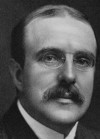
1863-1927
age about 45
1908 Photo
Parents
- Father: Frederick John Kingsbury (b. 1 January 1823, d. 30 September 1910)
- Mother: Alathea Ruth Scovill (b. 21 March 1828, d. 7 December 1899)
Biography
- Frederick John Kingsbury was born on 7 July 1863 in Waterbury, Connecticut.1
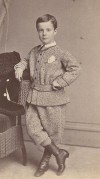 Frederick Kingsbury
Frederick Kingsbury
as a young boy
1863-1927- He graduated from St Paul's School, Concord, New Hampshire.2
- He graduated from MIT, Cambridge, Massachusetts, in 1884 where he studied mechanical engineering.2
- Frederick married Adele Townsend, daughter of Edward Mitchell Townsend and Belinda Rockwell, on 11 November 1886 in Trinity Church, New York City, New York.3
- They were married by the Rev Mess. Geer and CB Smith.4
- Frederick and Adele moved to Fairfield, Connecticut.
- After MIT he joined Scovill Manufacturing in Waterbury, CT. In 1889 he became involved with Bridgeport Brass Co., as secretary, vice-president, president 1909-1921, and then became chairman of the board. He was also president of AP Swoyer Co. of Philadelphia and treasurer of Bridgeport Electric Mfg. Co, a director of FNB in Bridgeport, and the Union New Haven Trust Co. He was interested in education of youths - he became involved with the International YMCA. He was Episcopalian. He lived in Fairfield, then in New Haven on Humphrey Street. "Man of genuine warmth and great personal charm". While at college he worked vacations first with a railroad construction gang and later in installation of a telephone system.2
- He was rather dictatorial towards his wife, and his daughter Ruth was terrified of him.5
- Frederick and Adele moved to New Haven, Connecticut.
- He and Adele appeared on the 1900 US Federal Census of 406 Humphrey Street, New Haven, New Haven County, Connecticut, enumerated on 1 June 1900. Also listed with the family were Jane Mitchell age 21 servant, Lizzie Reynolds age 24 servant, Hannah Parry age 27 servant. They rent their home.6
- He and Adele appeared on the 1910 US Federal Census of 445 Humphrey St, New Haven, New Haven County, Connecticut, enumerated on 28 April 1910. Listed with the household were Mary Noran age 37 servant, Anna Curtis age 26 servant, Mary McGuire age 21 servant.7
- Recollections of his grandson RCS Jr: Grandpa Kingsbury was a very stern man. When he said "jump" the only response was "how high". Every Sunday for dinner (mid-day) the family would gather at his house on Humphrey St. After dinner the men would retire to the billiard room and play. RCS Jr. has a mental picture of his grandfather "chalking the cue."5
- Frederick John Kingsbury was the President of the Bridgeport Brass Company.8
- He and Adele appeared on the 1920 US Federal Census of 445 Humphrey St, New Haven, New Haven County, Connecticut, enumerated on 2 January 1920. Listed with the household were Jesse Aird age 40 servant, Nora Burke age 28 servant and Margaret Gallager age 28 servant.8
- He died on 11 July 1927 in New Haven, Connecticut, at age 64.
- He was buried in Riverside Cemetery, Waterbury, Connecticut.1
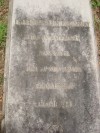 Gravestone
Gravestone - Another photo from 1908.1
Family: Adele Townsend (b. 23 August 1863, d. 17 February 1945)
- Ruth Kingsbury
 + (b. 29 August 1887, d. 8 December 1956)
+ (b. 29 August 1887, d. 8 December 1956) - Frederick John Kingsbury+ (b. 10 September 1895, d. 26 February 1971)
Story
Other Information
-
Relationship:
Great-grandfather of Linda Sargent
7th cousin 5 times removed of Kyle Lawrence Mueller
8th cousin 2 times removed of Julianne Stoughton - Charts/Lists: Ancestors of Ruth Kingsbury, Cemeteries of Connecticut, Descendant Chart for Elizabeth Alsop, Descendants of Nathaniel Foote and Elizabeth Deming, Descent from Henry Kingsbury, Eleanor of Aquitaine and LSR, Emily Dickinson and the Kingsburys, Ernest Hemingway and Mitchell, Gilbert Clifford Noble and Linda, Harriet Beecher Stowe and Kirsten, Jodie Foster and Sophie, Kingsbury Family, Kyle and Lisa (husband and wife) are related!, Louisa May Alcott and the Kingsbury Relations, My Ancestors, Nancy Reagan and Richard Sargent, Nathan Hale and Jack, Nathaniel Hawthorne and Kingsburys, President Gerald Ford and Linda, President Millard Fillmore and the Kingsburys, Prince William and Hannah, Richrd Gere - a Kingsbury, Story List of People, Tennessee Williams and the Kingsburys, Thomas Alva Edison and Tasha, Winston Churchill and Lisa
- Last Edited: 9 February 2025 10:58:49
Citations
Adele Townsend

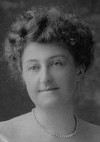
1863-1945
photo around 1900
age 37
Parents
- Father: Edward Mitchell Townsend (b. 7 October 1829, d. 2 February 1904)
- Mother: Belinda Rockwell (b. 26 February 1832, d. 13 April 1882)
Biography
- Adele Townsend was born on 23 August 1863 in New York City, New York.
- She completed eighth grade (I - LSR great-granddaughter - find this hard to believe.)1
- She appeared on the 1880 US Federal Census of Oyster Bay Village, Queens County, New York, enumerated on 5 June 1880, in the household of her parents Edward Mitchell Townsend and Belinda.2
- In 1881 Adele had a debutante party in New York City.
- Adele married Frederick John Kingsbury, son of Frederick John Kingsbury and Alathea Ruth Scovill, on 11 November 1886 in Trinity Church, New York City, New York.3
- They were married by the Rev Mess. Geer and CB Smith.4
- Adele and Frederick moved to Fairfield, Connecticut.
- Adele Townsend Kingsbury was elected member of Colonial Dames of America because of her ancestor Captain Nathan Seymour. Election 11 Oct 1898.
- Adele and Frederick moved to New Haven, Connecticut.
- Frederick John Kingsbury and Adele appeared on the 1900 US Federal Census of 406 Humphrey Street, New Haven, New Haven County, Connecticut, enumerated on 1 June 1900. Also listed with the family were Jane Mitchell age 21 servant, Lizzie Reynolds age 24 servant, Hannah Parry age 27 servant. They rent their home.5
- Frederick John Kingsbury and Adele appeared on the 1910 US Federal Census of 445 Humphrey St, New Haven, New Haven County, Connecticut, enumerated on 28 April 1910. Listed with the household were Mary Noran age 37 servant, Anna Curtis age 26 servant, Mary McGuire age 21 servant.6
- Frederick John Kingsbury and Adele appeared on the 1920 US Federal Census of 445 Humphrey St, New Haven, New Haven County, Connecticut, enumerated on 2 January 1920. Listed with the household were Jesse Aird age 40 servant, Nora Burke age 28 servant and Margaret Gallager age 28 servant.7
- Her husband Frederick John Kingsbury died leaving her a widow at age 64.
- In 1928 after their husbands died the two sisters Adele Townsend Kingsbury and Hannah Townsend Montant built the house in Murray Bay. Quebec, Canada.8
- She appeared on the 1930 US Federal Census of 64 Old Hartford Tpke, Hamden, New Haven County, Connecticut, enumerated on 3 April 1930. 3 servants were listed with the family. Real estate value $50,000. (She did not tell the truth about her age - said she was 60) Also she was listed as Frederick Kingsbury Jr. - as a widow. Also she said her parents were born in Connecticut, when they were born in NY. Perhaps she did not answer the censors, but someone else in the household did.9
- She appeared on the 1940 US Federal Census of 64 Old Hartford Tpke, Hamden, New Haven County, Connecticut, enumerated on 29 April 1940. Reporting house value of $30,000.1
- Four generations of Kingsburys.8
 4 generations
4 generations
Richard Sargent, Linda Sargent
Ruth Kingsbury Sargent, Adele Townsend Kingsbury - She died on 17 February 1945 in Hamden, Connecticut, at age 81.10
- She was buried in Riverside Cemetery, Waterbury, Connecticut.11
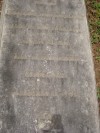 Gravestone
Gravestone
Family: Frederick John Kingsbury (b. 7 July 1863, d. 11 July 1927)
- Ruth Kingsbury
 + (b. 29 August 1887, d. 8 December 1956)
+ (b. 29 August 1887, d. 8 December 1956) - Frederick John Kingsbury+ (b. 10 September 1895, d. 26 February 1971)
Other Information
-
Relationship:
Great-grandmother of Linda Sargent
8th cousin 4 times removed of Kyle Lawrence Mueller - Charts/Lists: Amelia Earhart and Sophie, Ancestors of Ruth Kingsbury, Barnum and Joan, Cemeteries of Connecticut, Cole Porter - a Kingsbury, Genealogists, Kingsbury Family, Moore and Nicholas, My Ancestors, Norman Rockwell and Heidi, President George Herbert Walker Bush, Richard Nixon and Linda
- Last Edited: 19 September 2024 16:46:29